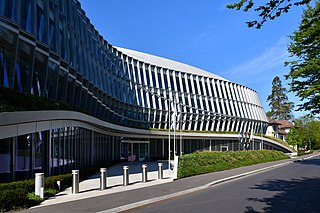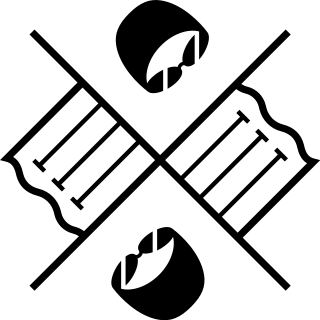
The International Olympic Committee is a non-governmental sports organization based in Lausanne, Switzerland.

A scandal can be broadly defined as the strong social reactions of outrage, anger, or surprise, when accusations or rumours circulate or appear for some reason, regarding a person or persons who are perceived to have transgressed in some way a social norm. These reactions are usually noisy and may be conflicting, and they often have negative effects on the status and credibility of the persons or organizations involved.
In competitive sports, doping is the use of banned athletic performance-enhancing drugs (PEDs) by athletic competitors, as a way of cheating. As stated in the World Anti-Doping Code by WADA, doping is defined as the occurrence of one or more of the anti-doping rule violations set forth in Article 2.1 through Article 2.11 of the Code. The term doping is widely used by organizations that regulate sporting competitions. The use of drugs to enhance performance is considered unethical, and is prohibited by most international sports organizations, including the International Olympic Committee. Furthermore, athletes taking explicit measures to evade detection exacerbate the ethical violation with overt deception and cheating.

The World Anti-Doping Agency is a foundation initiated by the International Olympic Committee based in Canada to promote, coordinate, and monitor the fight against drugs in sports. The agency's key activities include scientific research, education, development of anti-doping capacities, and monitoring of the World Anti-Doping Code, whose provisions are enforced by the UNESCO International Convention Against Doping in Sport. The aims of the Council of Europe Anti-Doping Convention and the United States Anti-Doping Agency are also closely aligned with those of WADA.

Cheating generally describes various actions designed to subvert rules in order to obtain unfair advantages. This includes acts of bribery, cronyism and nepotism in any situation where individuals are given preference using inappropriate criteria. The rules infringed may be explicit, or they may be from an unwritten code of conduct based on morality, ethics or custom, making the identification of cheating conduct a potentially subjective process. Cheating can refer specifically to infidelity. Someone who is known for cheating is referred to as a cheat in British English, and a cheater in American English.
Competitors at the Olympic Games have used banned athletic performance-enhancing drugs.

Richard William Duncan Pound, better known as Dick Pound, is a Canadian swimming champion, lawyer, and spokesman for ethics in sport. He was the first president of the World Anti-Doping Agency and vice-president of the International Olympic Committee. He is currently the longest-serving member of the IOC.
Cheating at the Paralympic Games has caused scandals that have significantly changed the way in which the International Paralympic Committee (IPC) manages the events.

Sun Yang is a Chinese Olympic and former world-record-holding competitive swimmer. In 2012, Sun became the first Chinese athlete to win an Olympic gold medal in men's swimming. Sun is the first male swimmer in history to earn Olympic and World Championship gold medals at every freestyle distance from 200 to 1500 metres. A three-time Olympic gold medalist and eleven-time world champion, he is the most decorated Chinese swimmer in history. In 2017, NBC Sports described him as "very arguably the greatest freestyle swimmer of all time".
Since China began its participation in the Olympic Games, the International Olympic Committee (IOC) has stripped Chinese athletes of three Olympic medals for doping. This represents less than 2% of the 154 Olympic medals that were stripped from all nations by the IOC for doping from 1968 to 2022. Three Chinese weightlifters were stripped of their gold Olympic medals at the 2008 Summer Olympics.
Doping, or the use of restricted performance-enhancing drugs in the United States occurs in different sports, most notably in the sports of baseball and football. As the United States is a global sporting superpower, the use of performance-enhancing drugs in the US is a notable and important issue, with wide-ranging repercussions for international sport.

The weightlifting competition at the 2020 Summer Olympics in Tokyo took place from 24 July to 4 August 2021 at the Tokyo International Forum.

Witold Bańka is a Polish former 400 metres sprinter turned politician. Since November 2015, he has been the Minister of Sport and Tourism in the cabinet of Beata Szydło and cabinet of Mateusz Morawiecki. In May 2019, he was elected President of the World Anti-Doping Agency (WADA).
Grigory Mikhailovich Rodchenkov is the former head of Russia's national anti-doping laboratory, the Anti-Doping Center. Rodchenkov is known for his involvement in the state-run doping program in Russia.
Systematic doping of Russian athletes has resulted in 51 Olympic medals stripped from Russia, four times the number of the next highest, and more than 30% of the global total. Russia has the most competitors who have been caught doping at the Olympic Games in the world, with more than 150.
A therapeutic use exemption (TUE), also known as a temporary use exemption, is a term created in 1991 and refers to an official medical document. The document gives an athlete permission to take a medication listed on the World Anti-Doping Agency’s (WADA) Prohibited List, normally prohibited because its use would be considered a performance enhancing drug. In 2017, the Australian and New Zealand Sports Law Journal referred to the abuse of TUEs as “The Legal Dope”.
Cheating in esports is a deliberate violation of the rules of an esports governing body or other behavior that is intended to give an unfair advantage to a player or team. At its core, esports are video game competitions in an organized, competitive environment. Tournaments often pay out prize money to the highest placing teams in these events, giving players an incentive to cheat. Commonly cited instances of cheating include the use of software cheats, such as aimbots and wallhacks, exploitation of bugs, use of performance-enhancing drugs, such as Ritalin and Adderall, and match fixing.

The swimming competitions at the 2024 Summer Olympics in Paris are scheduled to run from 27 July to 9 August 2024. Pool events took place at the Paris La Défense Arena, with the two-day marathon swimming staged at Pont Alexandre III through the Seine River.








